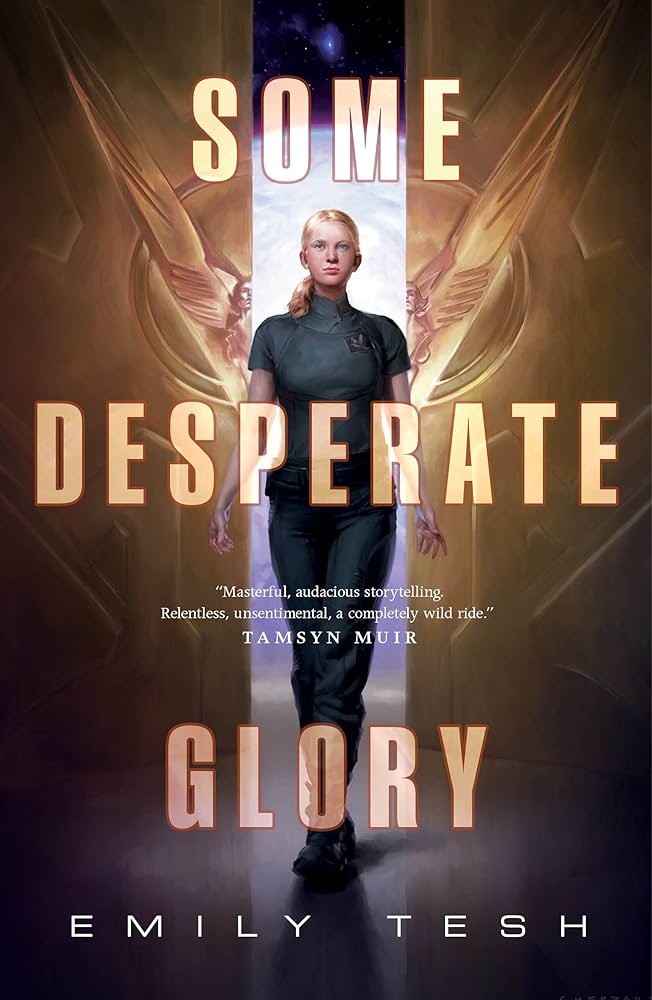"Some Desperate Glory": A Journey Through Justice, Self-Discovery, and Imperfection
Published on Jun 18 2024
Last updated on Jun 20 2024
"Some Desperate Glory" is one of those rare books that sneaks up on you and leaves an indelible mark. Set in a post-apocalyptic intergalactic universe, it tells the hero-origin story of Kyr, also known as Val, or Valkyr. Now, I'll be honest—I'm not usually a space sci-fi person. Give me a cozy mystery or a contemporary drama any day. But this book? It’s mind-blowing. It grabs you by the imagination and doesn’t let go.

Kyr starts out as a deeply flawed character. When she's sent to the Nursery, her only purpose is to give birth. Her brother's suicide haunts her, and she helplessly watches as Avi, her brilliant but morally compromised assistant, destroys countless worlds. Through these dark times, Kyr undergoes profound character development. She emerges from the shadows, transformed into a hero we can’t help but root for.
Kyr's journey resonates deeply with me. Her initial obsession with being the "perfect child of Earth," validated by Jole, mirrors my own struggle with perfectionism in society. Like Kyr, I've often felt the pressure to live up to external standards of perfection, seeking validation from others to feel worthy.
However, as Kyr discovers, this quest for perfection can be soul-crushing. Jole, whom she once saw as a source of validation, turns out to be just another flawed individual. This realization is a turning point for Kyr. Like a butterfly emerging from a cocoon, she breaks free from her shell and embraces her true potential.
The book is not just about Kyr’s journey; it's an exploration of heavy themes like fascism, racism, sexism, suicidality, trauma, rape, and injustice. Yet, it's done in such a way that you find yourself pondering these issues long after you've turned the last page. One of the most intriguing aspects is the paradox of parallel existentialism. The central question—does Val truly exist in Kyr’s timeline, or is Val just an alternate, trauma-free version of Kyr?—adds a layer of depth that is both fascinating and mind-bending.
This duality permeates the narrative. From the antagonistic relationship between Cleopatra and Kyr to the harmonious bond between Val and Cleo, the story contrasts sharply different realities. Even Mags, who suffers from depression in both timelines, presents varying shades of despair. And then there’s Jole, the universally detestable villain whose lust for power is constant, no matter the timeline. The character of Jole serves as a constant reminder of the dark side of power and the dangers of unchecked ambition. His presence in the story is a testament to the complexity of human nature and the thin line between good and evil.
The Wisdom, a mysterious force in the story, can be seen as a depiction of God and free will. It “allows all” yet “decides none,” touching on age-old theological debates about the nature of free will and destiny. If we could travel back in time, would free will still exist, or is it just an illusion? This philosophical exploration adds a rich, contemplative layer to the narrative.
Kyr’s attempts to change the past, and thus alter the future, bring up intriguing questions about fate and the nature of events. Interestingly, her initial efforts to improve her situation through time travel fail. But during the final time travel, when the Wisdom makes the choice—despite its claim of not making choices—the story concludes on a positive note. This raises the tantalizing question: did the Wisdom foresee everything, or did events unfold independently?
Emily's storytelling is masterful, emphasizing that "fairness" is an illusion in this universe. Instead, the story underscores the importance of understanding and honesty. Her exceptional use of language evokes a wide range of emotions, often with just a few words, making the reader deeply empathetic to the characters' plights.
One particularly poignant line is: “How can you call yourself my *friend,*” Avi said at last. This line can be interpreted in two ways simultaneously: Avi’s anger at Kyr for killing him after his actions led to her brother’s suicide, and his bewilderment at how Kyr could still consider Avi a friend despite everything. This duality encapsulates the profound complexity of friendship and betrayal, offering a new perspective on relationships and their inherent challenges.

This book was a surprising and remarkable discovery for me. It offers deep insights into the nature of friendship and the resilient nature of humanity, wrapped up in a sci-fi package that even a non-sci-fi person like me can appreciate. So, if you're looking for a read that challenges your perceptions and tugs at your heartstrings, "Some Desperate Glory" is a must-read. Trust me, it's worth stepping out of your genre comfort zone for this one.

Written by Alissa Nguyen
FollowAlissa Nguyen is a software engineer with main focus is on building better software with latest technologies and frameworks such as Remix, React, and TailwindCSS. She is currently working on some side projects, exploring her hobbies, and living with her two kitties.
Learn more about me